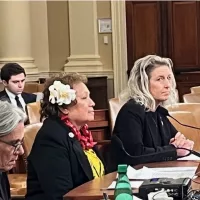
Congresswoman Uifaatali Amata testified before the House Ways and Means on the bill she introduced last week to permanently renew the American Samoa Economic Development Credit.
She said the StarKist Samoa cannery is crucial for the economic sustainability of American Samoa.
As the largest private sector employer in the territory the cannery provides 2,450 jobs or 25% of the island’s employment.
Other related industries on island, such as fueling, shipping and stevedoring, depend on the ongoing activities of the cannery to support their own operations.
Uifaatali explained that the American Samoa Economic Development Credit was designed to encourage investment in the US insular areas and create jobs by reducing the federal taxes on income earned by qualifying US business.
It has helped to alleviate the significant competitive disadvantages facing businesses in the territory, helping companies, including the cannery, continue operations on US soil; while competitors increasingly move business overseas to take advantage of cheap labor and foreign subsidies.
Here’s an excerpt from the Congresswoman’s testimony…
Play Audio





